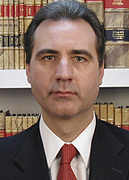
Notre Dame Law School and the Center for Civil and Human Rights are pleased to welcome Judge Eduardo Ferrer Mac-Gregor, Judge of the Inter-American Court of Human Rights, who will be visiting Notre Dame Law School from Monday, September 22 to Friday, October 3, 2014. As the Clynes Chair in Judicial Ethics, he will offer three seminars and a public lecture open to faculty and students.
The academic seminars provide a unique opportunity for the Notre Dame community to explore, under the guidance of Judge Ferrer Mac-Gregor, pressing topics in international human rights law generally and in the Inter-American human rights system in particular. Details on the seminars follow.
Please note: these seminars are open only to the Notre Dame community. Space is limited and registration is required. If you are interested in attending any or all of these seminars, please contact Kevin Fye at kfye1@nd.edu.
Monday, September 22, 3:30-4:45/3331 Biolchini Hall
The jurisprudence of the Inter-American Court of Human Rights regarding the death penalty. The cases addressed by the Inter-American Court of Human Rights concerning the imposition of death penalty are of particular importance in the development of the jurisprudence on the protection of the right to life in the Inter-American System, because it is not accurate to state that the death penalty is a punishment prohibited by international law or that it is per se incompatible with the American Convention on Human Rights. On the contrary, this punishment is accepted as a legal exception to the broad protection afforded by article 4 of the Pact of San José and the jurisprudence of the Court. This seminar addresses the limits of the death penalty in the Inter-American System that emerge from the text of the American Convention and other relevant treaties, and those that emerge from the Inter-American Court’s jurisprudence.
Wednesday, September 24, 3:30-4:45/3331 Biolchini Hall
The jurisprudence of the Inter-American Court of Human Rights regarding the forced disappearance of persons. The decade of the 70's and the 80's were violent times in Latin America. It was a period of profound political instability that derived in the emergence of military dictatorships in several countries in the region. Other regimes, although not dictatorial, but with strong authoritarian components, ruled countries like Mexico, Peru and Honduras. These regimes fought directly against their political opponents, often at the expense of the violation of the human rights of those persons or groups of persons that were considered "subversive" (especially those promoters of the creation of communist regimes). These human rights violations included the denominated "forced disappearances", a phenomenon that was addressed by the Inter-American Court for the first time in the "Honduran cases" in the late 80’s. This seminar explores the core elements of the Velasquez Rodriguez v. Honduras Case, which is the leading case on the subject matter, and analytically addresses the core elements of the Inter-American Court’s jurisprudence and the treaty based norms regarding the forced disappearance of persons.
Monday, September 29, 3:30-4:45/3331 Biolchini Hall
The jurisprudence of the Inter-American Court of Human Rights regarding amnesty laws. The case law on amnesty laws has been of great importance in the Inter-American System of Human Rights since the iconic judgment in the Case of Barrios Altos v. Peru, decided by the Inter-American Court of Human Rights in 2001. This case was a contribution of the Court that helped a number of States to investigate and punish those public officials who had committed serious human rights violations in the context of the dictatorships and authoritarian regimes that proliferated in Central and South America during the decades of the 70's, 80's and 90's, but that enjoyed the benefit of amnesty laws that extinguished criminal liability for the perpetrators of serious human rights violations. Some of these laws were enacted by the same military regimes that committed the human rights violations, which created an environment of impunity incompatible with the American Convention on Human Rights. This seminar addresses the basic features of the Barrios Altos Case, where the Court ruled for the first time the nullity ab initio of an amnesty law, and analytically describes the most important components of the Court’s case law on the subject matter.